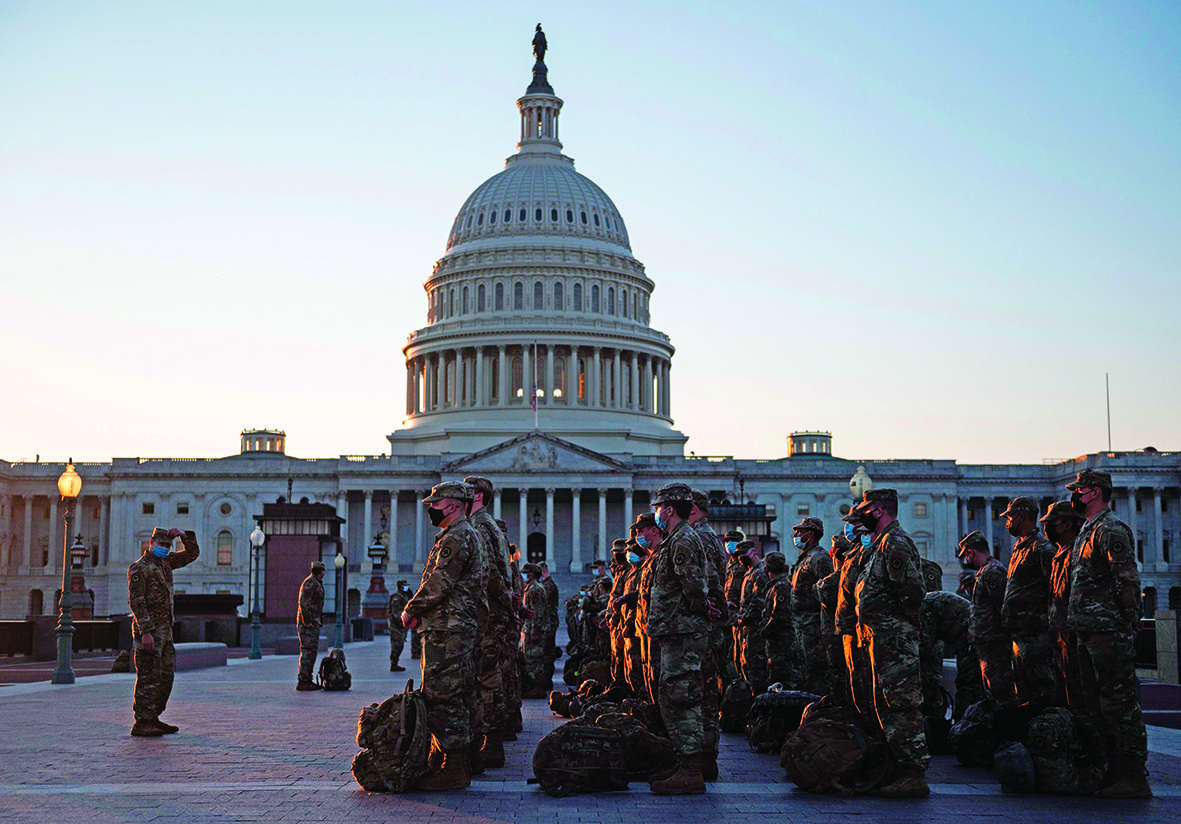 WASHINGTON: Members of the US National Guard arrive at the US Capitol in Washington, DC.-AFP
WASHINGTON: Members of the US National Guard arrive at the US Capitol in Washington, DC.-AFPWASHINGTON: Walking through central Washington, it is difficult to distinguish between those buildings boarded up due to pandemic closures, and those boarded up due to riots. The capital of the United States is known for its grand vistas, historical monuments and crowds of tourists, but the city has radically changed in the last year. "This is my first time (in downtown Washington) in a year. There's usually people walking all over the place. This is very, very quiet. I almost think it's like a ghost of itself," said Jaime, a mother from Maryland who did not wish to give her full name.
Hordes of schoolchildren who normally travel from all over the country to visit museums and see the White House now stay at home, as do most foreign tourists. The hectic jostle of politicians, lobbyists and lawyers on the street has also fallen quiet, while the large metro stations that bring workers in from suburbs are quiet and little-used.
The city of more than 700,000 inhabitants is subdued, one week before the presidential inauguration of Joe Biden on the steps of the Capitol. "The city is basically desolate," said Nadine Seiler, 55, who has been demonstrating every day since the end of October near the White House in favor of anti-racist causes. "Usually it's very stressful, but here it's like everybody's away on vacation," she added.
'It's all over'
As in many Western cities, many workers have been signing in from home-especially staff at big institutions headquartered in Washington such as the World Bank and the IMF, as well as the countless government agencies. The city's famous museums, most of them free, have been closed since March. And Mayor Muriel Bowser has again tightened restrictions so that restaurants can no longer serve any indoor customers. Eateries instead must try to survive by erecting tents and marquees along sidewalks, and tempting customers to sit down next to heaters of varying efficiency battling the winter cold.
"I went to the Christmas market... that's gone, all that's gone. You go into bars, (previously) packed bars-it's gone," laments Timothy Bartholomew, a resident of Arlington, just over the Potomac river. According to the specialist site Eater, nearly 70 restaurants have permanently closed in Washington since the start of the pandemic, and many others are boarded up without any certainty they will ever reopen. The economic fallout is even more starkly evident in the lengthening lines at soup kitchens, and the spread of tents sheltering homeless people under bridges and along main roads. Violent protests and unrest has also shaken Washington repeatedly in the last year.
After the death of George Floyd at the hands of the police in Minneapolis in May, Washington became one of the hotspots of nationwide anti-racist demonstrations. City authorities painted huge yellow letters reading "Black Lives Matter" across a wide street outside the White House, and the location became a popular site for rallies. But over the months, clashes between anti-racist activists and pro-Trump protesters have brought an edge of tension to the city.
Troops on the prowl
National Guard troops deployed on the streets of Washington began carry weapons late Tuesday in a major change of posture ahead of Joe Biden's inauguration as US president, according to an AFP photographer. The Guard soldiers were originally mobilized to provide mostly logistical support to Washington police, and on Monday General Daniel Hokanson, Pentagon National Guard Bureau chief, said they had not been authorized yet to carry weapons. Authorizing Guard members to deploy in a law enforcement role, armed and empowered to make arrests, would be a "last resort" if the security situation got out of hand, Hokanson said.
It was not clear what changed late Tuesday, and the city's National Guard had no comment. Security experts have said chatter among extremists and supporters of President Donald Trump on social media about holding armed marches and threatening violence in the US capital and other cities had surged in recent days. The Pentagon is mobilizing up to 15,000 National Guard for the January 20 inauguration, as Trump and supporters still refuse to accept Biden's election victory two months ago.
Five people died on January 6 when Trump supporters attacked and shut down the US Congress in an attempt to halt the certification of Biden's election win. At the time Guard troops were nearby, but were unarmed and called in too late to back up the Capitol Police to protect the legislature. The New York Times reported that weapons had been authorized Tuesday for the troops guarding the Capitol complex. - AFP










